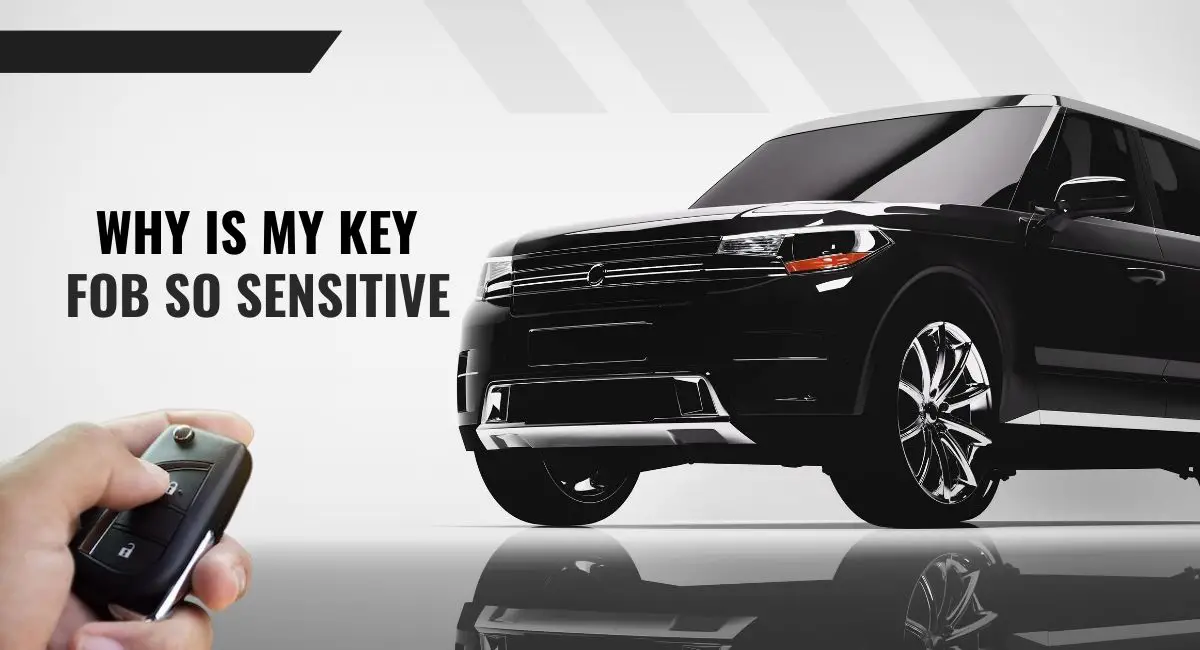In the fast-paced world of modern automobiles, key fobs have emerged as the unsung heroes of convenience and security. These nifty little devices have revolutionized how we interact with our cars, allowing us to effortlessly lock and unlock our vehicles, activate alarms, and even start the engine with a simple button. It’s a marvel of technology that brings a touch of futuristic elegance to our daily lives.
Nevertheless, even the most reliable devices can sometimes throw us a curveball. You may have found yourself frustrated and perplexed as to why your key fob suddenly becomes overly sensitive, seemingly responding to every little movement or touch.
On the flip side, you may have encountered the infuriating scenario of your car stubbornly refusing to acknowledge your key fob’s commands, leaving you stranded and perplexed.
This article will explore why my key fob is so sensitive, what can cause key fob interference, and the reasons behind key fob sensitivity problems. We’ll provide troubleshooting tips to help you resolve these issues.

Understanding Key Fob Sensitivity
Key fob sensitivity refers to the device’s responsiveness to signals, particularly radio frequency (RF) signals, which are for communication between the key fob and the car’s receiver.
When the key fob is overly sensitive, it may result in false alarms or unintended actions, while low sensitivity can lead to an inconsistent range and performance. Several factors contribute to key fob sensitivity, and understanding them is essential to grasp why your key fob might be overly sensitive or unresponsive.
Let’s delve deeper into these factors:
Radio Frequency (RF) Signals and Transmission
Key fobs rely on RF signals to establish a wireless connection with your car’s receiver. These signals carry instructions for locking or unlocking the doors. The sensitivity of the key fob determines how well it can pick up and interpret these signals. A highly sensitive key fob will be more receptive to weak signals, ensuring reliable communication between the key fob and the car.
Antenna Strength and Positioning
The antenna within the key fob plays a pivotal role in signal reception. It captures the RF signals emitted by the key fob and transmits them to the car’s receiver. The strength of the antenna impacts the key fob’s sensitivity, as a stronger antenna can capture signals from a greater distance.
Additionally, the positioning of the antenna within the key fob is crucial. If the antenna needs to be properly positioned or obstructed, it can hinder signal reception and lead to sensitivity issues.
Battery Condition and Power Level
The battery in your key fob provides the necessary power for transmitting signals to the car’s receiver. A low battery or battery degradation may exhibit sensitivity problems. When the battery is weak, the signals transmitted by the key fob may be weaker and more susceptible to interference. Regularly checking and replacing the key fob battery can help maintain optimal sensitivity.
Interference from External Sources
Key fobs operate within a crowded RF spectrum, which can lead to interference from various external sources. Overlapping frequencies from nearby devices, such as other key fobs or wireless communication devices, can interfere with the signals sent by your key fob.
Electromagnetic interference (EMI) from electronic devices like power lines or strong Wi-Fi signals can also disrupt key fob signals. Although not common, these interferences can affect the key fob’s sensitivity and overall performance.
Understanding the factors influencing key fob sensitivity allows you to identify potential issues that may arise. Whether your key fob is excessively sensitive, resulting in unintended actions, or fails to respond to your commands, recognizing these factors helps troubleshoot and resolve the problem effectively.
Potential Causes of Key Fob Interference
Key fob interference refers to external factors or sources that disrupt the key fob’s signals and communication with the car’s receiver. Interference can result in reduced sensitivity, leading to issues such as decreased range, unreliable signal reception, or unresponsiveness of the key fob. But what can cause key fob interference?
Radiofrequency Interference
The RF signals used by key fobs can be affected by overlapping frequencies from nearby devices, such as other key fobs or wireless communication devices. Electromagnetic interference (EMI) from electronic devices, including power lines, can also disrupt the key fob’s signals. Wireless networks and communication devices operating on similar frequencies can also cause interference.
Environmental Factors
Physical barriers, such as walls and buildings, can obstruct the RF signals between the key fob and the car’s receiver, resulting in decreased sensitivity. The distance and line of sight between the key fob and the vehicle also affect signal reception. Moreover, weather conditions, such as heavy rain or storms, can introduce atmospheric interference that affects the key fob’s performance.
Key Fob-related Issues
A key fob with a low battery or battery degradation may exhibit sensitivity problems. If the battery is weak, the signals transmitted by the key fob may be weaker, leading to reduced range and increased susceptibility to interference. Additionally, faulty components or internal circuitry within the key fob can cause sensitivity issues.
Troubleshooting Key Fob Sensitivity and Unresponsiveness
Why is my car not responding to my key fob? To address key fob sensitivity and unresponsiveness issues, you can follow these troubleshooting steps:
- Basic checks and maintenance: Begin by replacing or recharging the key fob battery, as a low battery can significantly impact sensitivity. Clean the key fob and the contacts to ensure proper electrical connection, as dirt or debris can interfere with signal transmission. Besides, modern vehicle systems can place significant demands on the car battery, leading to its weakening or complete discharge, which hampers the car’s response to the key fob. It is advisable to recharge the battery and, if it is old and worn out, to contemplate replacing it with a new one.
- A faulty or damaged key fob: sometimes you ask yourself, “Why is my car not responding to my key fob?” Don’t fret. Check whether the key fob is functioning well. A professional can help identify this issue and resolve it.
- Issues with the Keyless Entry System. Possible causes for a problem with the keyless entry system or start button include an antenna or wiring malfunction in the keyless entry system, software glitches, a damaged circuit board, or a defective start button. It is advisable to have your vehicle examined by a professional to identify any necessary repairs or replacements.
- Minimizing interference: Avoid keeping the key fob near electronic devices that emit strong RF signals, such as cell phones or Wi-Fi routers. Experiment with different antenna positions or orientations to find the optimal configuration for signal reception.
- Advanced solutions: Signal boosters or range extenders can amplify the key fob’s signals, increasing its range and overcoming minor interference issues. Resetting and reprogramming the key fob might also help resolve sensitivity problems. If the issues persist, it is wise to seek professional assistance or consult the car manufacturer for further guidance.
Important Read: How to Get Rid of Smelly Windscreen Washer Fluid
Conclusion
Key fobs have revolutionized how we interact with our cars, providing convenience and security. However, sensitivity issues with key fobs can disrupt their smooth functionality, causing frustration for car owners. Basic maintenance, minimizing interference, and exploring advanced solutions can help restore the proper functioning of your key fob. Remember, a well-maintained and properly functioning key fob enhances your overall driving experience and ensures the seamless operation of your car’s security and convenience system.
